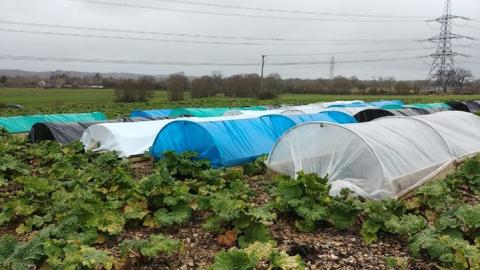Using photo selective films to enhance the profitability of leafy salad production in Wales
The wide uptake of polytunnels in the horticulture sector has offered growers a range of benefits of production such as an extended growing season, improved environmental management, enhanced resource use (e.g. irrigation) and improved efficacy of biological control compared with open field production.
Initial development of polytunnel films focused on high transmission of sunlight and extending durability. More recent development has led to a range of new photoselective polytunnel films which are able to modify the light that passes through a polytunnel to control certain growth characteristics and reduce diseases:
- UV transmission – Improved UV transmission can impact pest/disease development, and can improve the colour and nutritional value of crops (e.g. anti-oxidant content).
- Diffuse Transmission – Incoming light is subject to a high degree of scattering, creating a haze of light. Increasing light scattering improves distribution of light within the canopy, and can improve overall growth rates.
- Red: Far Red Modification – The ratio of red to far red wavelengths is an important physiological signal that can impact plant habit and the ratio of biomass invested in leaf and stem sections.
There is limited uptake to photoselective films within the small scale grower community which can be explained by the lack of knowledge about them, however they could have great potential. In this project two small scale horticulture units in Anglesey and Flintshire tried out different varieties of light-modifying plastics under normal growing conditions.
Project Outcomes:
- The project demonstrated that there was a benefit of protected cultivation compared with bare ground cultivation. At the start of the 2022 trial, plastic treatments had increased crop yields compared with bare ground cultivation that produced less yields.
- Light modifying plastics in the trials demonstrated that by manipulating the light exposure, in this trail specifically when using UV-blocking plastic it increased the head weight of the Lollo Rosso as well as increasing overall yield.
- The ability to improve growing conditions around crops, and potentially reduce pest and disease proliferation, could offer growers a low energy, chemical free way to improve crop performance. It could also improve water management and the need for irrigation by controlling water loss from plants and soil during hot, dry periods.
- Plastics may be particularly beneficial for propagation and early plant raising, particularly for field crops such as pumpkin which can be sown early under plastic before planting out.

